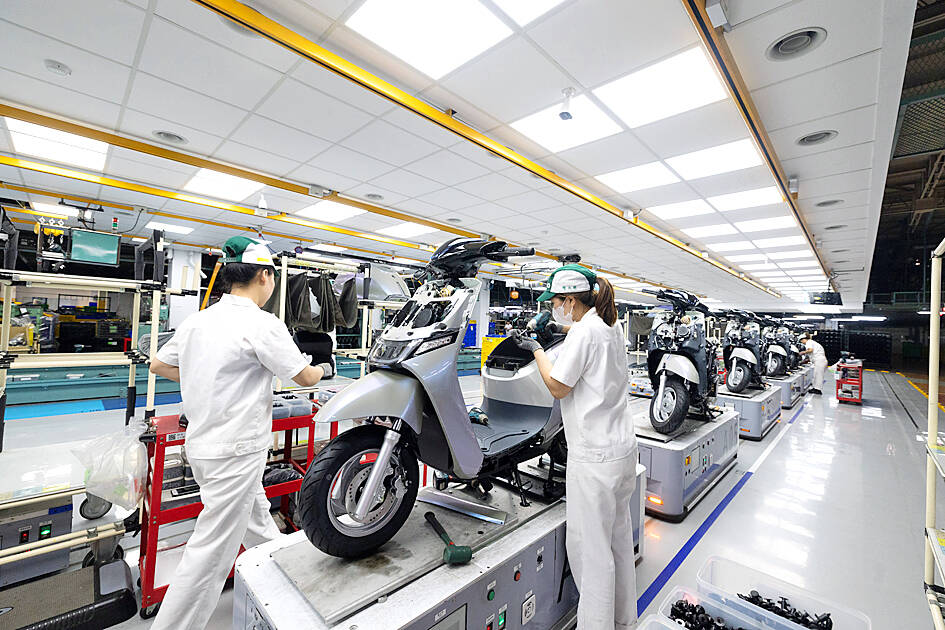Taiwan’s official manufacturing purchasing managers’ index (PMI) last month rose to 55.4, rebounding to expansion mode for the first time in 14 months, as firms rebuild inventory amid subdued uncertainty, the Chung-Hua Institution for Economic Research (CIER, 中華經濟研究院) said yesterday.
“The manufacturing industry reported business improvement in May, although uneven growth persisted,” CIER acting chairman Wang Jiann-chyuan (王健全) told a news conference in Taipei.
PMI data aim to gauge the health of the manufacturing industry, with values of 50 and higher suggesting expansion and scores lower than the neutral threshold suggesting a contraction.

Photo: CNA
It is the first expansion since May 2022 when Taiwanese manufacturers took a hit from a global slowdown induced by drastic inflation and monetary tightening.
The recovery came after the US and China put up decent economic showings with no new geopolitical tensions, Wang said.
That explained why the critical measures of new business orders and industrial output gained 13.7 and 10.9 points to 63.8 and 61 respectively, the monthly survey showed.
However, rush and short orders lingered, reflecting a conservative attitude among customers at home and abroad, Wang said.
Suppliers of electronics used in artificial intelligence products fared noticeably better than peers in other tech sectors, he said, adding that tech firms in general recover faster than non-tech companies, which remained weighed by weak demand and sharp competition.
The readings on inventory rose 2.1 points to 49.2, while customers’ inventory shed 1.8 points to 42.1, as they remained cautious, Wang said.
Sticky inflation in the US and the US Federal Reserve’s evasive stance on rate cuts lent support to that wariness, although firms grew more positive about their business prospects in the following months, the institute said.
The subindex on the six-month outlook rose 4.9 points to 60.1, its highest since April 2022, it said.
At the same time, the reading on raw material prices increased 2 points to 66.1, meaning that firms increasingly felt the pinch of price pressures.
The S&P Global Taiwan Manufacturing PMI, which was 50.9, arrived at a similar observation, finding that some manufacturers sought to protect their margin through a rise in output charges for the first time in five months.
The data on delivery time confirmed a recovery at 52.5, from 50.3 in April, as shipping container shortages and port congestions resurged due to conflict in the Red Sea, CIER said.
In related developments, nonmanufacturing companies also reported business improvements on the back of Mother’s Day celebrations, Wang said.
The nonmanufacturing index rose 0.1 points to 54.2, as service providers from almost all sectors registered positive cyclical movements, he said.
Nonmanufacturers reported positive views about their business, as evidenced by the six-month outlook, which rose 8.7 points to 63.6, the Taipei-based think tank said.
All sectors shared the optimism, thanks to the arrival of the high season for hospitality operators and TAIEX rallies that benefit financial service providers, it said.

‘SWASTICAR’: Tesla CEO Elon Musk’s close association with Donald Trump has prompted opponents to brand him a ‘Nazi’ and resulted in a dramatic drop in sales Demonstrators descended on Tesla Inc dealerships across the US, and in Europe and Canada on Saturday to protest company chief Elon Musk, who has amassed extraordinary power as a top adviser to US President Donald Trump. Waving signs with messages such as “Musk is stealing our money” and “Reclaim our country,” the protests largely took place peacefully following fiery episodes of vandalism on Tesla vehicles, dealerships and other facilities in recent weeks that US officials have denounced as terrorism. Hundreds rallied on Saturday outside the Tesla dealership in Manhattan. Some blasted Musk, the world’s richest man, while others demanded the shuttering of his

ADVERSARIES: The new list includes 11 entities in China and one in Taiwan, which is a local branch of Chinese cloud computing firm Inspur Group The US added dozens of entities to a trade blacklist on Tuesday, the US Department of Commerce said, in part to disrupt Beijing’s artificial intelligence (AI) and advanced computing capabilities. The action affects 80 entities from countries including China, the United Arab Emirates and Iran, with the commerce department citing their “activities contrary to US national security and foreign policy.” Those added to the “entity list” are restricted from obtaining US items and technologies without government authorization. “We will not allow adversaries to exploit American technology to bolster their own militaries and threaten American lives,” US Secretary of Commerce Howard Lutnick said. The entities

Minister of Finance Chuang Tsui-yun (莊翠雲) yesterday told lawmakers that she “would not speculate,” but a “response plan” has been prepared in case Taiwan is targeted by US President Donald Trump’s reciprocal tariffs, which are to be announced on Wednesday next week. The Trump administration, including US Secretary of the Treasury Scott Bessent, has said that much of the proposed reciprocal tariffs would focus on the 15 countries that have the highest trade surpluses with the US. Bessent has referred to those countries as the “dirty 15,” but has not named them. Last year, Taiwan’s US$73.9 billion trade surplus with the US

Prices of gasoline and diesel products at domestic gas stations are to fall NT$0.2 and NT$0.1 per liter respectively this week, even though international crude oil prices rose last week, CPC Corp, Taiwan (台灣中油) and Formosa Petrochemical Corp (台塑石化) said yesterday. International crude oil prices continued rising last week, as the US Energy Information Administration reported a larger-than-expected drop in US commercial crude oil inventories, CPC said in a statement. Based on the company’s floating oil price formula, the cost of crude oil rose 2.38 percent last week from a week earlier, it said. News that US President Donald Trump plans a “secondary